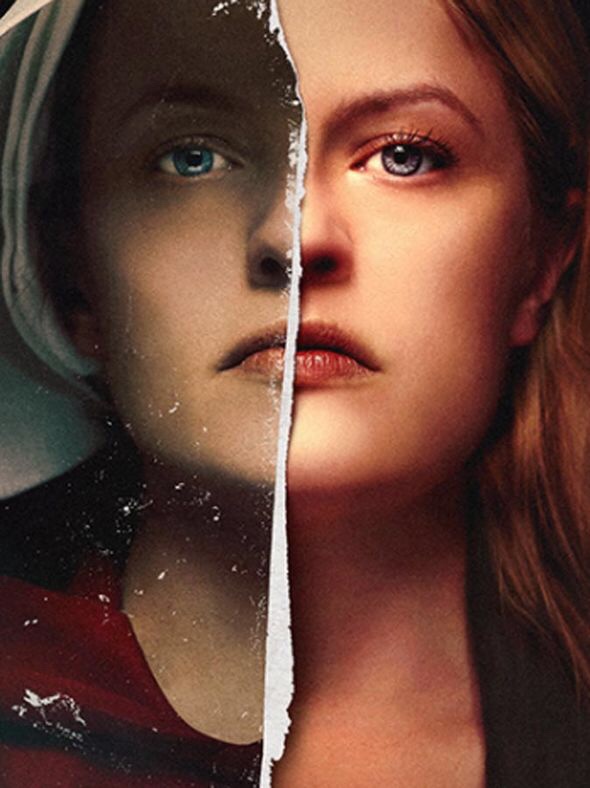As chapter 2 begins, Offred explains the making of her bedroom. She indirectly states how they have removed anything that could potentially contribute to suicide or be a weapon. The words and phrases such as “they allowed,” “defines us,” and “thoughts must be rationed” emphasize the control and restrictions.
- No glass
- Window doesn’t open completely
- Windowpane is shatterproof
- Removed anything that can hang a rope
- Door does not shut completely or lock
Aunt Lydia describes it as “being in the army;” she should see it “not (as) a prison but as a privilege.”
What?? Brainwashed much?
Offred explains that Handmaids dress entirely in red with white wings framing their faces. Marthas wear green. Wives wear blue. This defines them.
Offred secretly wishes she could talk to Rita and Cora, but they are forbidden to engage in relationships with each other. So, instead, she often listens in on their conversations. I don’t blame her; a girl needs some company.
Offred has to go shopping for the house. She collects tokens from Rita, which is their currency. Like many things, reading is forbidden, so there are images on the coins: 12 eggs, cheese, and steak.
Chapter 3
As Offred begins to explain the rigid, controlling structure of their society, she often narrates gradually through flashbacks that tell about her past.
Offred looks back on when she was sent to the Commander’s house because the two other men she was previously assigned to didn’t work out. She arrived at the house with hopes that the Commander’s wife would be different, but, on the first day, she told her to stay out of sight.
“I am a reproach to her; and a necessity.”
We begin to see the rebellious personality of Offred when she notices the Commander’s wife smoking a cigarette. She states that they are forbidden for women to have along with coffee and alcohol. However, this gives her hope because it assures her that there is a black market, meaning there is always a way around the order of things.
As this chapter comes to an end, Offred finally recognizes the Wife’s familiar face- Serena Joy. She was the lead soprano from Growing Souls Gospel Hour, a Sunday morning religious program. Isn’t she such a growing soul, though? The irony.
“So it was worse than I thought,” Offred exclaims.
Chapter 4
As Offred leaves the house to shop, Nick, a Guardian of the Faith, winks at her. In fear, she ignores him because she thinks he may be an Eye. Eyes are spies assigned to test them. She waits on her partner, Ofglen, because each Handmaid must have a partner when walking. When she arrives, they do their usual, orthodox greetings. They say no more than this.
“The truth is that she is my spy, as I am hers; … the other will be accountable.”
Although Offred tells us that Ofglen has only been here for two weeks, she does not tell us what happened to her other partner. She claims she doesn’t know. Maybe she does know, but she does not want to remember it.
There are Guardians that play the role of keeping them “safe.” However, young Guardians can be dangerous because they are “fanatical” and jumpy with their guns. Just a week ago, they shot a woman who was fumbling through her robe for her pass. .They took the wrong idea of thinking she was looking for a bomb and shot her without hesitation. Perhaps something similar might have happened to Offred’s ex partner. Offred hears Cora and Rita speaking about the situation.
“Doing their job, said Cora. Keeping us safe.”
Rita speaks out in anger, making it directly known that she did not agree. Cora refers to it as an accident. Rita states that “everything is meant.”
Indeed it is.
Back to reality. Offred flirts with the Guardians at checkpoint. He looks into her eyes and blushes. She thinks of placing her hand on his face.
“It’s an event, a small defiance of rule, so small as to be undetectable, but such moments are the rewards I hold out for myself, like the candy I hoarded, as a child, at the back of the drawer. Such moments are possibilities, tiny peepholes.”
This is one thing I’ve really started to pick up and like about Offred. She’s very intuitive, and, yes, she has an agenda. I don’t know what her plan is yet, but I know in the back of my mind she has one. She considers how much they must desire to have a Handmaid of their own. They aren’t permitted to touch a woman, so they must touch with their eyes instead. Offred teases them by swaying her hips as she walks away. Girl knows what she is doing! She immediately says she’s ashamed for doing it. However, she quickly takes back that statement and says she actually isn’t ashamed because she enjoys the power. This is all women have. Her body is her power because pornographic magazines and films are forbidden. “They have no outlets now.” She knows they will suffer.
Chapter 5
Offred glances back on the pre-Gilead days when women were not protected. She thinks about the freedom she had. She thinks about her control. This is more torture than if she were just born into this society; she would have nothing to compare it to. Because she’s had a life so much sweeter, she desires it badly.
“There is more than one kind of freedom, said Aunt Lydia. Freedom to and freedom from. In the days of anarchy, it was freedom to. Now you are being given the freedom from. Don’t underrate it.”
Back in what’s really going on, Offred and Ofglen are inside a store when a woman walks in. Everyone begins to whisper and the room shifts. She’s pregnant. The women covet her. Offred recognizes her from the Red Center. She used to be known as Janine, now Ofwarren. Offred believes she only went shopping to show off. She envies her.
She begins to think of her husband and her daughter. She remembers a detail of their life together. She would store plastic bags under the sink, and Luke would get worried that their daughter would get the bag caught over her head. Luke sounds so sweet and seems like such a good dad. She says she “took too much for granted.” these stories make me sad, but it’s the only way to really see the perspective of Offred and get to know her character better.
As they finished their shopping, they encountered Japanese tourists. She notices their short skirts, high heels, calling them “instruments of torture.” Girl, you sound like Aunt Lydia. Their hair was exposed because they do not cover their heads. “Darkness and sexuality,” she calls it. They are fascinated but also repelled. She remember dressing like that. She remembers the sweet taste of freedom. Their interpreter asks them to take a photograph. Offred says no. she doesn’t even look them in the face; she looks down and shakes her head.
“I also know better than to say yes. Modesty is invisibility, said Aunt Lydia. Never forget it. To be seen– to be seen — is to be– her voice trembled– penetrated. What you must be, girls, is impenetrable.”
That explains why she always thinks someone is spying on her; Aunt Lydia is always in her head. “We are secret, forbidden, we excite them.” The tourists ask them if they are happy. Ofglen does not respond, so Offred replies, “yes, we are very happy.” She knows she had to say something because they may be Eyes.

Chapter 6
On their way back, they always take the long way. Ofglen asks to go by the church. Offred expresses that she thinks that Ofglen does everything for show. She doesn’t really mean what she does. As she bows her head in prayer, she thinks she only does it to look good. Offred also thinks that Ofglen probably perceives her the same way too. They cannot trust each other because they do not know each other; however, this is not their fault. Offred reveals they really come to see the Wall; this is where they hang people. She calls this a Men’s Salvaging. They “must be made into examples, for the rest.” She’s supposed to feel hated and scorn toward them, she says. But, instead, she feels relief because none of them are Luke. She’s hoping he’s still alive, telling herself he is. Ofglen starts crying, Offred says she “can’t afford to know.” She has no sympathy for her.
“Ordinary, said Aunt Lydia, is what you are used to. This may not seem ordinary to you now, but after a time it will. It will become ordinary.”
However, Nick does call her by her real name and tells her to trust him. This could mean that he really has helped her to get out, or he really is the Eye that Ofglen was telling her about and he snitched her out for being a traitor.



